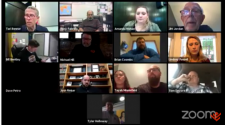NASHVILLE, Tenn. (WKRN) — The Metro Nashville Police Department is working to change how officers respond to calls regarding a person’s mental health.
This was one of the goals for the newly created Office of Alternative Policing Strategies. It’s being led by Inspector David Imhof, former commander at the East Precinct for the past 10 years. He recently received his Master’s Degree in Clinical Mental Health Counseling.
“It’s always been something that’s of interest to me, even in college I was a sociology major, psychology minor. I was a DCS caseworker before I was a police officer for three years. I investigated child abuse and child sexual abuse cases. I’ve been a negotiator since I’ve been in the police department, I’ve been a detective since I’ve been in the police department,” Imhof said. “You see struggles when you work cases and you work with individual families. I’ve been here 28 years and you realize – like Chief Drake says – you’re not going to arrest your way out of this. In therapy, you always talk about issues above the waterline as opposed to issues below the waterline. Those issues above the waterline are those symptomatic things – acting out behaviors that we all see, that we all need to address. But so often we fail to address those issues underneath, those core issues underneath the waterline.”
Metro police are now working to have a clinician respond to these call alongside a Metro police officer. The pair would ride together during each shift.
“If you think about it, they’re also going to be available for other calls for service because wouldn’t it is fantastic to have a therapist in the car on a domestic violence case or on a death notification or a tragic accident where people are distraught,” said Inspector Imhof. “Having a mental health expert on those scenes would be advantageous for us and those we serve.”
Metro police officers responded to about 3,000 of what they refer to as “10-35 calls” last year. These include calls about people who are suicidal or need to be transported for psychological evaluation. Inspector Imhof said the department is also working to get all officers trained for Crisis Intervention. In the meantime, the officer riding with the clinician would have that training.
“It’s also a resource that has connections to community services available to them. I think that’s invaluable to have those connections, to have those points of reference to where you can call people and also you can do follow-up with that too,” said Imhof. “I think just having that expertise that an officer is just not going to have – we’re not going to have the have the ability to train these officers to have the expertise that licensed clinicians because these folks are at least masters level certification.”
He said MNPD is evaluating how other departments have implemented similar programs, including Denver, CO. Denver is a city with a department size that’s comparable to Nashville and after starting their pilot program with three clinicians riding along with officers, it has since expanded to 22 clinicians, and also includes homeless outreach along with EMS.
MORE: Denver program has clinician, paramedic respond to some mental health 911 calls instead of police
“They have some advantages maybe that our city and state do not – there is a tax in that city and that’s what I’m finding about a lot of these states and cities is that there’s a revenue stream to fund those programs,” Imhof explained.
He hopes the the Nashville community will do more to be educated on mental health.
“I think everybody has come into contact or had family members or friends that have struggled with some type of mental illness from depression to anxiety to severe mental illness such as bipolar or schizophrenia (something of that nature), but I think we’ve all touched it,” he said. “I think everybody having a lot more awareness about that and understanding about it would be so beneficial not just for the police department but for everybody. For neighbors to understand mental illness, knowing that my neighbor across the street may be suffering from something, that doesn’t make them necessarily dangerous. There’s such a small percentage of people that suffer from mental illness that would be considered dangerous.”















